How Diverse is the Wine Industry Now?
Has the soul searching following Black Lives Matter led to real change?
How Diverse is the Wine Industry Now?
Has the soul searching following Black Lives Matter led to real change?

by Evgeniy Pavlovski/Shutterstock
When you look at the totality of people on a vineyard, the people who care for the plants and the people who work behind the scenes in tasting rooms and cellars, the wine industry is overwhelmingly diverse—brimming with people of color, members of the LGBTQ+ community and women.
But when you look at it from the outside, that diversity is rarely seen. Often, the people actually running wine businesses are white and male, and their stories are the ones that get told.
The fact that the wine industry is powered by a heterogenous group but run largely by white men, some say, is a matter of what the wine industry—and the broader culture—values and prioritizes.
“People don’t see the wine industry as diverse, but if you include the story of the people in the vineyard, we are very diverse,” says Sofia Torres-McKay, co-owner of the Dundee Hills, OR-based Cramoisi Vineyard and co-founder of AHIVOY (Asociación Hispana de la Industria del Vino en Oregon Y Comunidad), an organization that aims to empower the largely Latinx community of vineyard stewards through education. “To me, the work that is done in the vineyards is often the most interesting part of the story of wine. ”
But the reality, says Torres-McKay, is the people who are there in the vineyard every day, caring for the grapes, shape the outcome of the wine just as much as its terroir—the environmental factors: climate, soil and elevation.
During the pandemic, when the Black Lives Matter (BLM) and #MeToo movements gained support from Americans (about 67 percent of people supported BLM in 2020, according to the Pew Research Center, and about 49 percent of people support #MeToo), both individuals and brands looked for ways to support businesses, as well as hire and promote people who more accurately reflect the population of the country. For a moment, it seemed like the tide had turned. Not only would the people who do the work get recognition for it, but they might be given the opportunity to move up in the industry.
What has the hope and promise led to? Three years after Black Lives Matter and #MeToo gained widespread acceptance, not only has the support for BLM dropped to just 51 percent, the progress and opportunities that seemed just around the corner appear, to many, to be further away than ever.
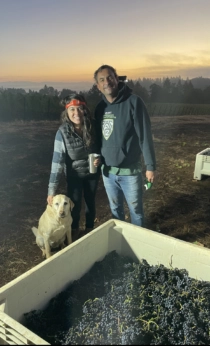
Breaking down diversity
America is an increasingly diverse country. A recent study of the voting population throws the numbers into context: About 38 percent of voters aged 18-25 identify as people of color, compared with 32 percent of millennials, 28 percent of Generation X and 21 percent of Baby Boomers. The US is 50.5 percent women to 49.5 percent male. The percentage of the population that identifies as LGBTQ+ is now 7.1 percent, double what it was in 2012, according to a recent Gallup poll.
But the percentage of BIPOC individuals who own a winery or serve as head winemakers is less than one percent, and women account for just around 14 percent of winemakers (up from 10 percent in 1890, which must constitute one of the slowest growth curves in history). There has been some progress though: 38 percent of winery owners or co-owners are now women. There are no comprehensive assessments of the percentage of openly LGBTQ+ winemakers and winery owners, but the numbers, according to observers, do not come close to reflecting the population.
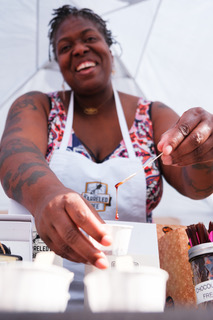
Economic challenges and progress
Marketing professor and wine business researcher Dr. Monique Bell has conducted two groundbreaking studies of Black wine entrepreneurs, providing a snapshot of the challenges and advances.
When comparing the two studies, Bell found that the biggest issue for Black entrepreneurs was finding funding. “[It’s] actually increased between 2020 and 2023, with 50 percent now reporting that as their number one challenge, versus 43 percent in 2020,” says Bell. Respondents also believe “that Black wine entrepreneurs face racial bias and racism more in the wine industry than they would in other industries.”
In lieu of support from financial institutions, almost nine out of 10 Black-run wineries either self-fund their businesses or rely on family and friends for support. More importantly, only 50 percent of Black-owned businesses were profitable in the past year. Despite that, 90 percent of respondents say that they are more optimistic about the future of their business than they were a year ago.
Bell says that unless the industry, government and trade associations step in with financial and distribution support, the rise of Black wine entrepreneurs will be slow and painful.
Organizations such as Our Legacy Harvested, founded in 2020 by Tiquette Bramlett, are hoping to bridge some of those gaps in support by bringing BIPOC winemakers together.
“I have been in the industry at this point for close to a decade,” says Bramlett. “In 2020, it became clear to me that people who look like me aren’t finding a lot of opportunities in the wine industry. I wanted to create a community that isn’t just about bringing in more Black and Brown people, but about connecting members of wine country who want to increase the diversity of their staff, and also support more BIPOC businesses generally.”
Bramlett wanted the process to feel organic, she says, because she thought it would foster longer-lasting and deeper connections. Her first step was to throw a party.
“We did a socially distant party in [Oregon’s] wine country, inviting 35 BIPOC vendors,” says Bramlett. “Winemakers came and made connections that are still growing and thriving today.”
But Bramlett wanted to do more, and so did members of the wine community. Next came paid internships at wineries, with a funded place to leave and transportation to and around wine country included.
“The first year, 2022, we had more than 100 applicants and just four places to fill, which shows how much of a hunger there is for this kind of program,” she says. The internships were a success and will continue, along with shorter opportunities for folks who can’t take three months off of their jobs and lives to move to wine country.
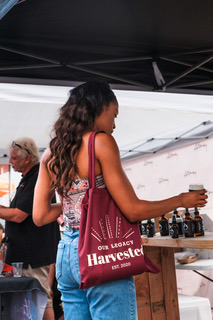
Offering new opportunities for visibility
“While the vast majority of the people caring for grapes in the vineyard are LatinX, they are unseen, and not really considered by the average wine consumer,” says Torres-McKay. “Not only that, but they don’t have the opportunity to see what their work turns into. Most people who spend their careers working in vineyards never see a tasting room or cellar.”
That creates a disconnect for all.
AHIVOY, Torres-McKay’s education organization, offers classroom work at a community college, visits to wineries, cellar tastings and visits to parts of the winery with which workers might not be familiar, such as the bottling line. “That way, if they’re pulling leaves, they know why. It will lead to riper fruit, which will make the wine taste better. Once they understand why they’re doing things, they become more invested in the process, and can ask better questions and do a better job.”
The results, she says, have been fruitful for the dozens of workers who have gone through the program since it was first offered in 2020.
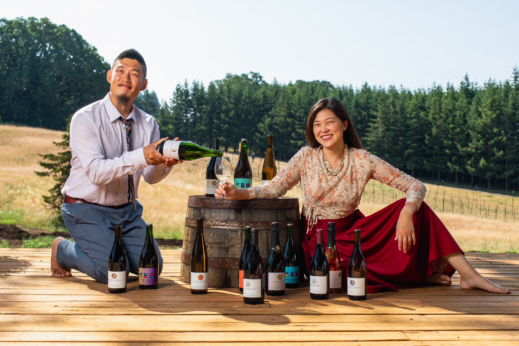
Like the LatinX community, the Asian American Pacific Islander (AAPI) community is much more diverse than people realize. Lois Cho founded the Oregon AAPI Food & Wine Festival this year to educate wine lovers and shatter preconceived notions about the community.
The inaugural event, held this past May in Dayton, OR, offered bites from five AAPI chefs and wine tastings from five AAPI wineries. It sold out quickly, and she plans to grow and evolve the events and offerings next year. AAPI wineries have already reached out to them, and they already have 13 wineries from across the country on board for 2024.
But Cho has more in mind than simply changing the narrative around AAPI food and wine.
“When we reached out to a distributor initially, they told us not to highlight our ethnicity,” says Cho. “At first, it seemed like maybe that would make sense, because it’s typically thought of as such a traditional European business. But it actually ended up inspiring me to embrace and lean into it. We’re opening a tasting room this spring and we’re going to lean into nontraditional pairings, like an Asian-inspired charcuterie board and Asian-inspired pizzas like Korean Spicy Chicken.”
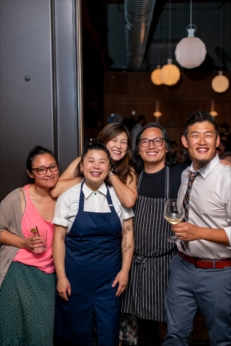
Providing support and outreach
Remy Drabkin, one of a handful of prominent queer winemakers in the country, also became the first queer-identified person to hold the office of mayor of McMinnville.
“I think now, especially as many states enact laws that create hostile environments for trans and queer people, sharing our voices and experiences is more important than ever,” says Drabkin.
The Remy Wines vintner founded Wine Country Pride to amplify voices in the local Oregon wine community and more broadly through regular fundraisers and events that also in turn provide scholarships for LGBTQ+ youth and support organizations that advocate for the community.
In 2022, Remy Wines hosted the first inaugural Queer Wine Fest, to celebrate queer-made and grown wines from across the country.
“It has turned into its own thing, which is really inspiring to see,” says Drabkin. Queer people in the wine industry “is not a new thing… but now we’re creating a framework that has made and will continue to make us stronger than we’ve ever been.”
Wineries should continue to push for greater diversity and inclusion because it’s the right thing to do, through job outreach and good old-fashioned just-for-fun event activations. But ultimately, money talks. But what it’s telling us may surprise folks: Study after study shows that businesses that empower BIPOC and LGBTQ+ individuals and women make more money—a lot more money.
“I see what we do as an opportunity for everyone, not a confrontation between two different groups,” says Torres-McKay. “Wineries and vineyard managers also benefit, because they have a stronger and more empowered and informed team.”
Follow us

This work is licensed under a Creative Commons Attribution-NoDerivatives 4.0 International License.
Want to republish a Modern Farmer story?
We are happy for Modern Farmer stories to be shared, and encourage you to republish our articles for your audience. When doing so, we ask that you follow these guidelines:
Please credit us and our writers
For the author byline, please use “Author Name, Modern Farmer.” At the top of our stories, if on the web, please include this text and link: “This story was originally published by Modern Farmer.”
Please make sure to include a link back to either our home page or the article URL.
At the bottom of the story, please include the following text:
“Modern Farmer is a nonprofit initiative dedicated to raising awareness and catalyzing action at the intersection of food, agriculture, and society. Read more at <link>Modern Farmer</link>.”
Use our widget
We’d like to be able to track our stories, so we ask that if you republish our content, you do so using our widget (located on the left hand side of the article). The HTML code has a built-in tracker that tells us the data and domain where the story was published, as well as view counts.
Check the image requirements
It’s your responsibility to confirm you're licensed to republish images in our articles. Some images, such as those from commercial providers, don't allow their images to be republished without permission or payment. Copyright terms are generally listed in the image caption and attribution. You are welcome to omit our images or substitute with your own. Charts and interactive graphics follow the same rules.
Don’t change too much. Or, ask us first.
Articles must be republished in their entirety. It’s okay to change references to time (“today” to “yesterday”) or location (“Iowa City, IA” to “here”). But please keep everything else the same.
If you feel strongly that a more material edit needs to be made, get in touch with us at [email protected]. We’re happy to discuss it with the original author, but we must have prior approval for changes before publication.
Special cases
Extracts. You may run the first few lines or paragraphs of the article and then say: “Read the full article at Modern Farmer” with a link back to the original article.
Quotes. You may quote authors provided you include a link back to the article URL.
Translations. These require writer approval. To inquire about translation of a Modern Farmer article, contact us at [email protected]
Signed consent / copyright release forms. These are not required, provided you are following these guidelines.
Print. Articles can be republished in print under these same rules, with the exception that you do not need to include the links.
Tag us
When sharing the story on social media, please tag us using the following: - Twitter (@ModFarm) - Facebook (@ModernFarmerMedia) - Instagram (@modfarm)
Use our content respectfully
Modern Farmer is a nonprofit and as such we share our content for free and in good faith in order to reach new audiences. Respectfully,
No selling ads against our stories. It’s okay to put our stories on pages with ads.
Don’t republish our material wholesale, or automatically; you need to select stories to be republished individually.
You have no rights to sell, license, syndicate, or otherwise represent yourself as the authorized owner of our material to any third parties. This means that you cannot actively publish or submit our work for syndication to third party platforms or apps like Apple News or Google News. We understand that publishers cannot fully control when certain third parties automatically summarize or crawl content from publishers’ own sites.
Keep in touch
We want to hear from you if you love Modern Farmer content, have a collaboration idea, or anything else to share. As a nonprofit outlet, we work in service of our community and are always open to comments, feedback, and ideas. Contact us at [email protected].by Kathleen Willcox, Modern Farmer
December 14, 2023
Modern Farmer Weekly
Solutions Hub
Innovations, ideas and inspiration. Actionable solutions for a resilient food system.
ExploreExplore other topics
Share With Us
We want to hear from Modern Farmer readers who have thoughtful commentary, actionable solutions, or helpful ideas to share.
SubmitNecessary cookies are absolutely essential for the website to function properly. This category only includes cookies that ensures basic functionalities and security features of the website. These cookies do not store any personal information.
Any cookies that may not be particularly necessary for the website to function and are used specifically to collect user personal data via analytics, ads, other embedded contents are termed as non-necessary cookies.
That’s great, hopefully the wine industry will grow stronger so that market value will have more competition, giving users greater choices.